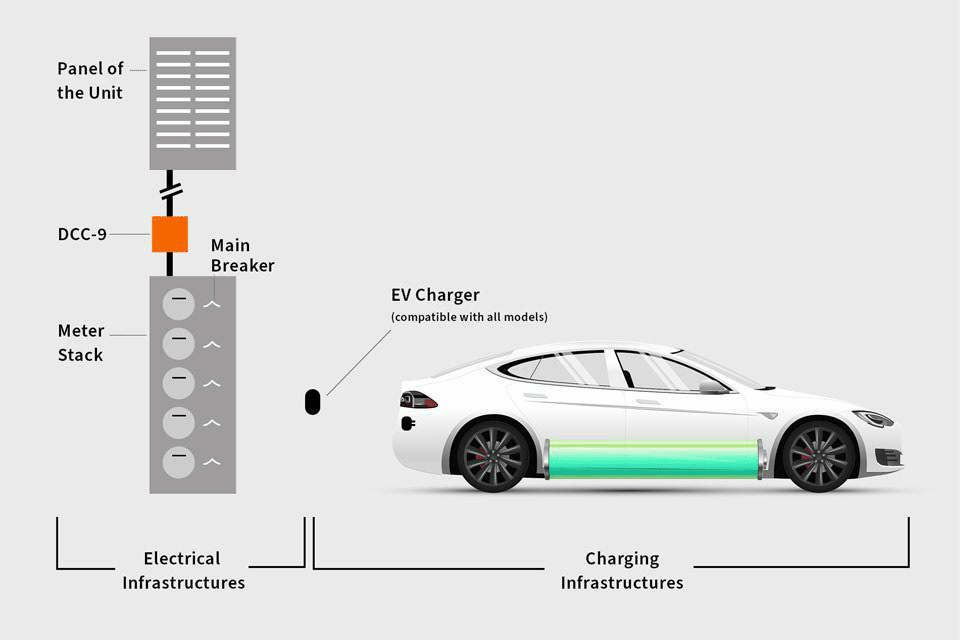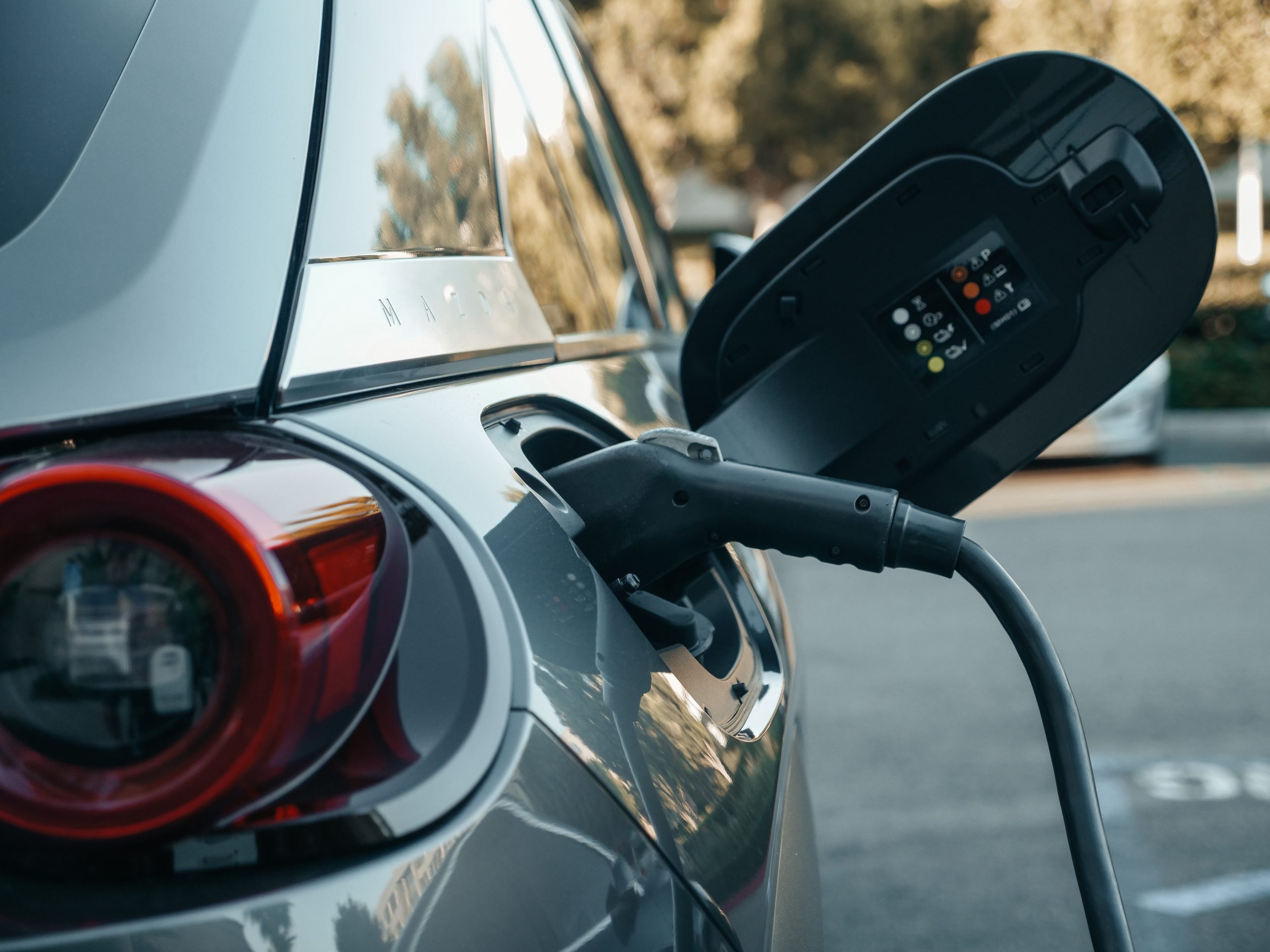Is there a way to make EV charging convenient for condo residents?
Resound Energy Services™, the Pacific Northwest’s leading EV charging contractor, understands the dilemma for condo owners and HOAs.
That’s why our Dynamic Demand Control technology lets condo owners connect to their individual unit’s electrical panel, even if the car is parked in the communal garage. As a result, condo owners can enjoy fast Level 2 EV charging without utilizing the building’s common area power. In addition, HOAs will not need to be reimbursed for consumption as the usage costs will be added to the owner’s existing utility bill.

The Capacity Problem Solved
Most American buildings were built before the start of the EV revolution, and they weren’t designed with the capacity to accommodate individual unit electrical usage from the common electric panel.
The vast majority of a condominium’s available electrical capacity is distributed amongst panels of individual units. Those panels are typically tied to the utility meter located in a parking garage electrical room.
Resound Energy Services™ Dynamic Demand EV management systems are installed near the meter banks, providing convenient access to each unit’s electrical line. The Dynamic Demand control unit connects to the homeowner’s panel at the meter stack in the garage.
So, how does Resound Energy Services™ get around capacity limits without upgrading a building’s entire electrical infrastructure? Dynamic Demand Control measures, in real-time, the condo’s available capacity in the homeowner’s panel. The available power is then sent to the charging station. If ever the panel is using 80% or more of its available capacity, the controller prioritizes the unit and stops charging the vehicle until a safe amount of capacity becomes available.
The Billing Problem Solved
Common area power usage must be reimbursed, typically without making a profit, to the HOA. This presents a unique challenge for condominiums when trying to understand how they can provide charging amenities to individual owners.
With Dynamic Demand Control‘s individual-panel topology, individual owners’ consumption will be billed directly to their existing utility bill, eliminating the need for the HOA to be involved in billing or reimbursement for electrical consumption by EV chargers.
Benefits to the building
The addition of EV charging stations increases the value of properties and units and makes a building more desirable to live in.
In the not-too-distant future, it’s easy to imagine that EV Charging at Condos and all residences will be a requirement (it’s already happening in some areas). But even before that, condo owners will come to expect EV charging in the same way they expect laundry facilities.
EV charger installation rebate
As the government takes measures to combat climate change and incentivize green behavior among consumers, lucrative tax rebates are popping up everywhere. Of course, there are state and federal tax rebates on the purchase of an electric vehicle. But there’s also a 30% utility rebate on EV charging station installation. (Up to $30,000 for commercial applications if the HOA wants infrastructure to help make individual installation more equitable and $1,000 for individuals.)
At Resound Energy Services™, we leverage combined decades of experience with a passion for change to help existing and prospective property owners upgrade their facilities and site plans to meet the consumption needs of the future. We’re proud to help facilities and stakeholders take advantage of EV charger installation rebates, plan accessible charging layouts, and comply with state and federal regulations throughout. Because we’re familiar with local utility programs nationwide, we are well-positioned to help you procure the highest possible incentives.
How to find a reliable EV Charger Installation Company
Much like in the solar industry, EV charger installers are popping up everywhere. However, there isn’t a single electrical contractor that surpasses our expertise. Energy efficiency is our passion, and our mission is to create an exquisite experience for each client and condo owner.
Unlike many of the newer companies, we have a thorough process for assessing and implementing EV charging assets, regardless of how the property’s electrical infrastructure is structured. Each project manager has the expertise to maximize your tax rebates and overall cost savings for when you install EV charging at condos or retrofit LED lighting for safer common areas and improved efficiency.
About Resound Energy Services™ Services
Proudly headquartered in Seattle, WA, Resound Energy Services™ also serves Spokane, WA, Portland, OR, Phoenix, AZ, Albuquerque, NM, Denver, CO, and Newark, NJ.
We are licensed, bonded, and insured. We offer energy-saving lighting and EV charger installation and maintenance for commercial offices, warehouses, industrial buildings, retail establishments, shopping centers, as well as multifamily units.
The future of Electric Vehicles
With climate change and increasing gas prices top of mind for many Americans, it’s no surprise that the automotive industry is taking note and going green. A single gas-powered vehicle can release as much as three times its weight in greenhouse gasses over its lifetime, but in 2019, only about 1.8 percent of the cars on the road were electric. By 2025, experts predict that that number will jump to 10 percent. Nearly every automotive manufacturer is working toward offering plug-in cars – many already do. Some have even announced that they’ll soon only sell hybrid and battery-powered electric vehicles. So it’s easy to see that in the near future, EV growth will become exponential. Are we ready for that day?
Saving gasoline and the climate aren’t the only benefits of electric vehicles (EVs). They’re easier and cheaper to maintain, they are much quieter than their internal combustion engine grandparents, and in some states, you can sail past traffic in EV and HOV-dedicated lanes. Combined with the fact that you receive a hefty tax credit upon purchase of an electric vehicle, it’s easy to see why going electric is more than just a trend.
EV charger installation is already becoming a must-have for property buyers. A home in an EV-friendly neighborhood sells for about 1.5 times the amount of a comparable home in a nearby less EV-friendly neighborhood. Furthermore, those EV-friendly neighborhoods have property values that are 2.6 times higher than the rest of the country.
The barriers to EV equity
Electric vehicles do have a high upfront cost, but luckily, prices are dropping and will continue to do so. Plus, those somewhat higher car payments are worth it, as EVs are cheaper to operate and maintain.
Still, the long-term economic benefits seem out of reach for many lower-income people who live in apartments and typically purchase used vehicles. Moreover, even if they could afford the monthly car payment, they usually lack access to 240-volt outlets in their parking lots or garages.
Those who live in dense urban housing complexes often have old, unreliable, and oversubscribed electrical infrastructures. For example, during 2021’s weather-related blackouts in Texas, poor and marginalized groups were four times as likely to suffer outages.
The federal government is working toward making electric vehicles much more accessible, but until then, Dynamic Demand Control allows even densely-packed multifamily complexes to provide individual charging stations at no cost to building management or the HOA.
Are there enough charging stations?
Depending on where you live, you may find that a few gas stations have charging ports (if they even work), and some retail shopping centers offer charging stations. For single-family homes, a Level 1 EV charger from an ordinary 120 volt home outlet can take as long as 42 hours to take a battery from empty to full. Fortunately, Level 2 EV chargers are more than twice as powerful as Level 1 chargers and can deliver up to 60 miles of drive time per hour of charge time.
However, getting 240V power for a level 2 charger can be a challenge for those who live in condominiums. HOAs could install common use level 2 chargers in some garages (if there are stalls available), but we all know the challenges of getting an HOA to specially assess a cost that won’t be used by all residents. And what about HOA restrictions on power usage, reimbursement for power consumption, and equitable constraints?
What this means for you
Offering electric vehicle charging isn’t just a way to distinguish your property or satisfy green-minded homeowners. Very soon, it may be obligatory. Electric vehicles aren’t just an optimistic dream for the future; they’re our solution for maintaining the American automotive lifestyle. Electric vehicles may seem few and far between on the roads now, but that’s changing right before our eyes. To combat gaps in charging service availability, some cities are making strides to require EV-compatible amenities in multifamily residential properties and similar settings.
Charging availability shouldn’t be a barrier to a greener lifestyle – or more lucrative business practices. Get in touch with an EV charging expert today to change how you stay topped off. Make a statement. Talk to one of our EV experts to find out how your multifamily complex can transition from part of the problem to part of the solution.

